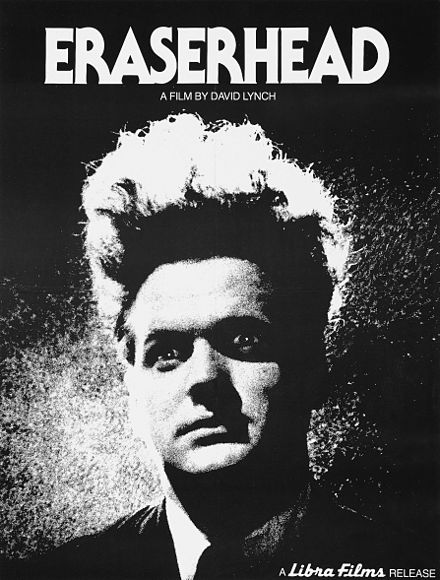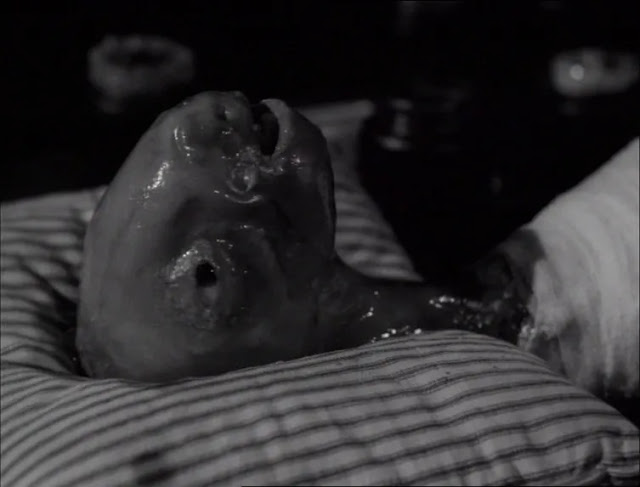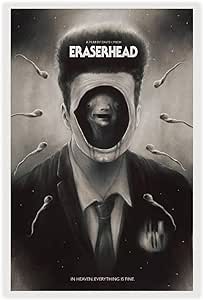ERASERHEAD (1977)
DIRECTED & WRITTEN by David Lynch
STARRING - Jack Nance as Henry Spencer, Charlotte Stewart as Mary X, Allen Joeseph as Mr X, Jeanne Bates as Mrs X, Jean Lange as Grandmother, Judith Anna Roberts as Beautiful Girl Across The Hall, Laurel Near as Lady In The Radiator, Jack Fisk as Man In The Planet.
PLOT - Henry is a quiet, nervous man living a humdrum existence in a dark industrialised city.
Henry's girlfriend - Mary X - has become pregnant. After an awkward meeting with Mary's parents Henry and Mary decide to move in together so that Henry can be a proper father to his child.
The child is born - it appears to be some kind of mutant. The child's endless crying drives Mary hysterical and she leaves Henry to look after the child alone.
What is the child ?, why is it sick ?, and who is the strange woman that appears to be living inside Henry's radiator ?...
DIALOUGE - The Woman In The Radiator - "In Heaven everything is fine, in Heaven everything is fine. You've got your good things...and I've got mine."
PERFORMANCES - Eraserhead hinges mainly around one central performance that carries the entire film - namely that of Jack Nance playing the film's central character - the hapless Henry Spencer.
Nance always seemed to have a slightly nervous and twitchy screen presence in whatever role he played, here is no exception. When we first see Henry he's going to visit his girlfriend - Mary (Charlotte Stewart) and - presumably - to meet her parents for the first time. Nance as Henry shambles through these scenes looking tense, sweaty and socially awkward. Poor Henry's nerves are strained to breaking point by the bizarre behaviour of Mary's mum and dad. Mary's dad (Allen Joeseph) makes banal stilted conversation with Henry about "manufactured chickens" and stares unblinkingly at him with an unnerving fixed grin. It's both creepy and hilarious at the same time. Henry for his part looks very put out by this.
Henry is later given the third degree by Mary's mum (Jeanne Bates), she pumps him for information regarding what he does for a living and if he's good enough for her daughter before then trying to seduce Henry. Once more Henry looks (understandably) massively uncomfortable. Nance plays these scenes well and really sells the awkwardness of the situation.
It's then revealed that Mary is pregnant and that Henry must effectively step up to the mark and accept his responsibilities as a father.
Fast forward nine months (presumably...seeing as this is a David Lynch film it may well be a week later) and Henry and Mary are living together with thier mutated child. Thier relationship has crumbled and Mary leaves Henry to look after the baby on his own. It's at this point that Nance really comes into his own as poor hapless Henry stumbles though the rest of the movie looking uncomfortable, bemused and horrified in equal measure. It's a great performance helped by Nance's awkward looking physicality and that ridiculous (yet strangely iconic) hairstyle.
Jack Nance would go on to work with Lynch for the rest of his life including roles in Lynch's version of Dune and as Pete Martell in the original run of Twin Peaks.
SFX - Possibly the most memorable aspect of Eraserhead is its effects work, specifically Henry's mutated baby...
Presumably this little chap is some kind of puppet but it just looks incredibly realistic and lifelike. It manages to be somehow pitiful, oddly cute and utterly repellent all at once. Considering that Eraserhead had a miniscule budget (it was basically a student film) the effectiveness and realism of the child is especially impressive. To this day Lynch still hasn't revealed how the effect was achieved and always gives cryptic answers when asked. It's been suggested that the baby may be a lamb foetus that was somehow "puppetised" but this theory has never been confirmed.
There's also some blood and gore in parts, some in-camera effects and some bizzare make-up work for the Lady in the Radiator (with her swollen chipmunk-like cheeks) and the odd looking Man in the Planet character.
We also get some strange looking "manufactured chickens" and a not entirely convincing severed head which works well enough in the context of the film.
SEX & VIOLENCE - Sex (and reproduction) is one of the themes of the film. Nothing is shown graphically, its all done in a subjective and artistic way. The film opens with a portrayal of conception and then ramps up the sexual imagery - the baby is sperm-like with its tadpole shape, Henry dreams of other sperm-like creatures seeming to "give birth" to them from his mouth.
Henry is seen to be very lacking in social skills and yet women throw themselves at him - his girlfriend Mary, Mary's mother and finally the beautiful girl across the hall who seduces and sleeps with Henry. The sex scene between Henry and the girl consists of the two kissing and slowly sinking into a misty, milky white pool. There are certain interpretations that can be read into this...
It could be argued that the entire film is a metaphor for both sex and the responsibilities that can potentially arise from engaging in sex.
The violence is also (mostly) metaphorical. The Lady in the Radiator stamps Henry's sperm creatures underfoot. The "manufactured chickens" bleed and shake when jabbed with a fork as if they are still alive.
At one point Henry dreams that his head falls off (it is replaced by the head of the baby)...
Henry's "real" head falls to the floor, drowns in its own blood and then seems to fall into another realm where it smashes open on the floor like a watermelon. A young boy picks the head up and sells it to a pencil factory where it is then turned into erasers (hence the movie's title).
In what is probably the only "real" act of violence in the film, Henry finally snaps and murders his deformed child with a pair of scissors. It's a brutal and disturbing scene.
RATING - Due to its subject matter and its "arty" presentation Eraserhead won't be to everybody's taste...and thats absolutely fine because its not really meant to be.
There are many things this film isn't - it isn't conventional, it isn't particularly coherent and it isn't always likeable. But it IS very atmospheric with its beautiful black and white photography. It IS disturbing and interesting in equal measure and it DOES posses a quirky and eccentric central performance.
The best way to approach this movie is to think of it as a fever dream. A piece of art. You'll get out of it what you bring to it and that's probably about the most I can say. It's definitely a film that you have to be in a certain mood to watch.
Put it on late at night, turn down the lights, crack open a beer and just absorb it. Let it ebb and flow over you and it's weird atmosphere will do the rest. Well worth your time, even if you only watch it once. If you're a fan of the later works of David Lynch then this film is ABSOLUTELY essential viewing.
5 mutant sperm babies out of 5. An art-house, late night, cult classic.
ART -










.png)











.jpg)
Comments
Post a Comment